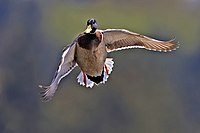Europe restricts poultry as bird flu spreads to eight European nations
Thursday, February 16, 2006
Authorities across Europe have issued restrictions on commercial poultry farms, following the outbreak of bird flu in eight previously unaffected nations. The virus has been found in migratory birds much earlier than had been expected.
Tests have confirmed that wild swans in Greece, Bulgaria, Italy, Austria and Germany had died from the deadly H5N1 strain of the virus. Other suspected cases of the virus have been detected in Slovenia, Croatia and Denmark.
European health officials had expected wild birds migrating from Africa to Europe in spring to carry the disease into Western Europe. It is thought that swans were migrating from Russia and Ukraine to the Black Sea driven by unusually cold weather.
Globally, 91 people have died after contracting the virus from close contact with diseased birds, but the greatest concern for European authorities is that an outbreak will occur among domesticated fowl, destroying local poultry industries. The H5N1 strain of bird flu is highly contagious, and lethal to birds. A single outbreak can kill tens of thousands of birds, and all birds must be culled across a wide region to prevent the spread of the disease.
No domesticated poultry or humans are thought to be infected in Western Europe at this time. Authorities continue to conduct intensive checks.
A number of countries across Europe, including Denmark, Sweden and the Netherlands have required that domesticated fowl be kept indoors. In Germany and Hungary, two mile protection zones have been placed around the locations where dead swans, with all poultry required to be kept indoors and the shipping of meat outside the zones prohibited.
The European Union has toughened its bans on poultry products and now bans the importation of untreated bird feathers into its 25 member nations. The EU also hopes to test 60,000 wild birds and 300,0000 domestic birds as part of its bird flu surveillance program.
In France, the government asked citizens to keep domesticated fowl indoors throughout the country. Domesticated ducks will be vaccinated.
Sources
edit- "Dead swans in Germany mark spread of bird flu" — Cape Times, February 16, 2006
- "EU moves to halt spread of bird flu" — China Daily, February 16, 2006
- By Richard Bernstein and Elizabeth Rosenthal. "Europe takes action as bird flu spreads" — New York Times, February 16, 2006
